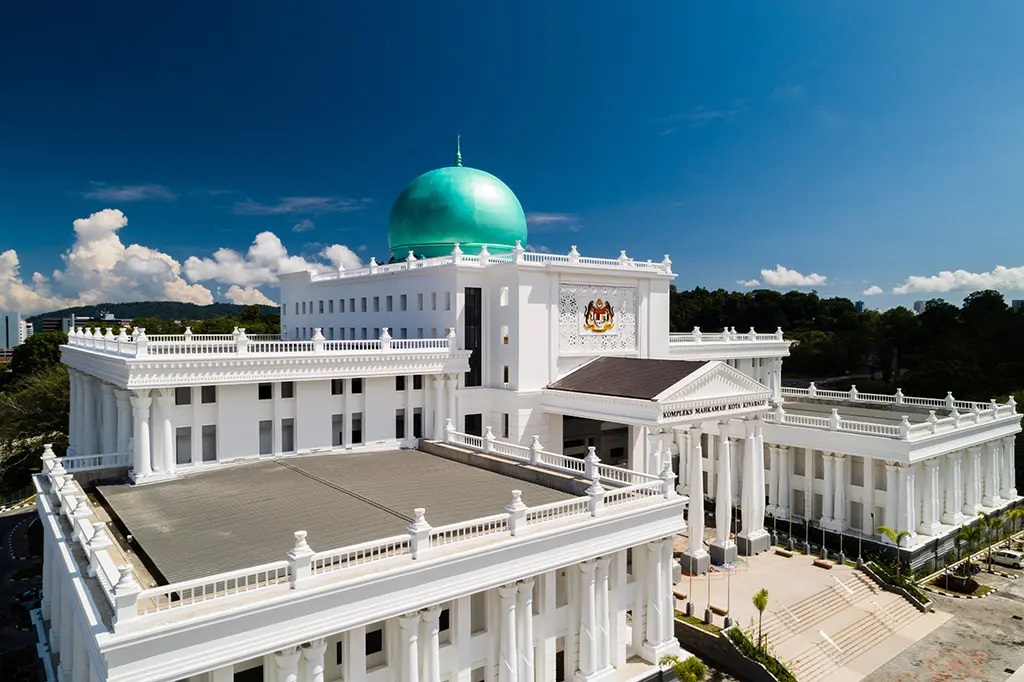
UMS’ Coral Nursery Site team placing cube-shaped blocks which serves as structures for corals to attach to and as shelter for fish.
KOTA KINABALU (Nov 28): A Coral Nursery Site has been established at the Universiti Malaysia Sabah (UMS) jetty today, as part of the university’s Borneo Marine Research Institute’s (IPMB) contribution to coral reef conservation and preservation efforts in Kota Kinabalu waters.
UMS Vice-Chancellor Prof Datuk Dr Kasim Mansor said the effort highlights how coral reefs are the lifeblood of marine ecosystems, not only providing habitat for many marine life species, but also playing an important role in protecting coastlines from erosion, supporting fishing activities and being a major attraction in the tourism sector.
Prof Kasim said acknowledging that unfortunately, human activities such as unsustainable development, pollution and climate change have caused serious destruction to the precious ecosystem, they are taking several proactive steps through the launching of the coral nursery.
He said firstly, restoring affected coral reef areas, thus supporting efforts to conserve marine biodiversity in Sabah waters.
Secondly, providing a study and learning site for students so that they can better understand the role and challenges of conserving marine ecosystems.
Thirdly, engaging local communities, non-governmental organisations, government agencies and universities in strategic collaboration to ensure the sustainability of marine resources.
“The Coral Nursery Site programme also supports the goals of the Coral Triangle Initiative (CTI) and the Sustainable Development Goals (SDGs) that we all strive for, in protecting underwater life and contributing to action to address climate change through the construction of artificial habitats.
“In addition, this programme also provides an opportunity for all of us to raise public awareness of the importance of preserving coral reefs as a valuable asset to our ecosystems and economies.
“Indeed, this effort is a shared responsibility, and we need to unite to ensure the continuity of these conservation efforts for future generations,” he said when inaugurating the site.
His text speech was read by UMS deputy Vice-Chancellor (Academic and International) Prof Dr Shahril Yusof.
IPMB director Prof Madya Dr Faihanna Ching Fui Fui said the coral nursery consists of ten cube-shaped blocks that act as concrete structures to provide a hard, suitable for corals to attach to, and the space inside the cubes also functions as a shelter for fish.
Prof Faihanna reminded however, that the success of a coral nursery does not happen overnight, as placing the structures is just the beginning.
She said the nursery needs to be maintained regularly to reduce threats such as algae growth and predator attacks on the corals growing in the nursery, and the surrounding environment must also be suitable for coral growth, as pollution such as sediment, debris and solid waste can cause coral disease and death.
“The launch of this coral nursery is an important step to foster awareness and collective responsibility towards the conservation of our marine treasures for the sake of future sustainability.
“Through education and awareness programmes, IPMB aims to increase public understanding of the importance of coral reefs and marine ecosystems, as well as their shared role in marine conservation efforts,” she said.
Her text speech was read by IPMB Deputy Director (Academic and International) Dr Zarinah Waheed.
The project’s organising chairman Dr Mohammad Fikri Akmal Mohammad Khodzori said since the ten blocks were placed on October 16, fish have been spotted at the coral nursery site.
As for the corals, he emphasised that they will take time to grow, coupled with a biweekly cleaning of algae sediments off the blocks to encourage them to grow.
Mohammad Fikri highlighted that there have there has been many coral reef restoration and conservation efforts in Sabah, such as by Sabah Parks or World Wide Fund for Nature (WWF) Malaysia, and this is IPMB’s contribution to their cause and is also their first effort to be implemented near a jetty while directly involving the students, where they got to learn how to install coral nurseries and care for them as well as the biology of corals, reflecting IPMB and UMS’ commitment to supporting efforts that have a positive impact on the environment and society.
In addition, he said the coral nursery project was partly sponsored by CTI Malaysia – a key member of the multilateral partnership of six countries including the Philippines, Malaysia and Papua New Guinea in the Coral Triangle Initiative on Coral Reefs, Fisheries and Food Security (CTI-CFF) which aims to jointly protect the Coral Triangle, a 2.3 million square miles area where more than 70 percent of the world’s corals live – and the Ministry of Natural Resources and Environmental Sustainability (NRES).
“Following the launch of this coral nursery, I hope that more restoration and conservation efforts can be carried out in Kota Kinabalu waters, specifically near Pulau Uda and Pulau Sepanggar which are not under Sabah Parks, as healthy corals have been seen in those areas in particular,” he said.






